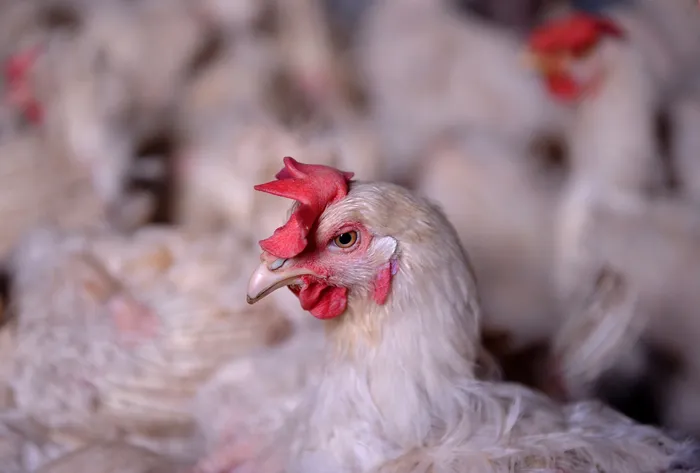
The government is hinting at yet another blow to the country’s poultry producers, says Fairplay
Image: Umfanekiso ogciniweyo
The government is feeding South Africa’s chickens to eagles swooping in from the United States. Not for the first time, the country’s poultry industry is being sacrificed to secure a trade deal with the US. Worse, it is happening without consultation with the industry on the details or implications of what it is proposing, or possible alternatives.
No trade deal has yet been concluded, and there is little information about what South Africa is putting on the table. Yet, as it attempts to avert the 30% tariffs on all South African exports that President Donald Trump has threatened, the government is hinting at yet another blow to the country’s poultry producers.
A statement by trade minister Parks Tau gave little away. Outlining what South Africa had proposed – so far without any response from the US – Tau said South Africa had offered increased access to South African markets for US poultry producers. This would be achieved “by (the) simplifying of US poultry exports under the 2016 tariff rate quota and unlock approximately $91 million in trade”.
Exactly what this means is anybody’s guess – the only thing that is clear is that, as in 2015, the poultry industry is once again going to be made to suffer for the sake of a trade deal. The 2016 quota which Tau hopes to “simplify” resulted from negotiations in 2015 when the US demanded that South Africa exempt huge volumes of US chicken from the anti-dumping duties that should apply according to World Trade Organisation rules. This was a make-or-break condition for the renewal of South Africa’s benefits under the African Growth and Opportunity Act (Agoa).
The result was an annual quota which started at 65 000 tonnes in 2016 and rose to 72 000 tonnes last year. It was effectively a licence to dump chicken in this country – US producers could send South Africa their chicken offcuts at any price they chose, and the country could do nothing about it unless the quota was exceeded. The quota was exceeded in early years, rising to nearly 83 000 tonnes in 2019, before US exports dropped sharply as bird flu spread across the country. The fact that US negotiators are once again pushing for duty-free chicken exports indicates that they anticipate the flow will resume.
The sting was that the US chicken quota was tied to the Agoa agreement, which is itself under threat. In terms of the US Agoa legislation up for renewal again this year, if South African industries lost their beneficial access to US markets, then the chicken quota falls away. Because of tariffs already ranging from 10% to 25%, those benefits have been lost by South Africa’s steel, automotive and fruit industries, so the quota should no longer apply. Poultry producers have asked for the quota to be nullified, but they have so far been ignored.
Does Minister Tau intend to “simplify” the quota by making it a standalone item, not linked in any way to Agoa, which may or may not be renewed? That would expose South African poultry producers to a potential R1.65 billion worth of unfairly priced US bone-in chicken pieces such as leg quarters. These are the cuts specified in the anti-dumping duties which the US has demanded should not apply. Minister Tau should remember that those anti-dumping duties were recommended by the trade regulator ITAC, which falls under his department.
Since 2000, ITAC has repeatedly renewed anti-dumping duties - and has just done so again – because, in terms of World Trade Organisation rules, it has found that US chicken is being imported at unfairly low prices, threatening the local poultry industry and its jobs. Now Minister Tau wants to make it even easier for US poultry producers to dump their chicken here, competing with the popular packs of locally produced individually quick frozen (IQF) chicken pieces. South African chicken farmers and South African jobs will be at risk.
Not only does this extend the contravention of international trade rules, but it is completely against the spirit and objectives of the poultry master plan, which he is in charge of resuscitating. The master plan aims to protect the South African poultry industry from unfairly priced imports, boost local chicken consumption and expand local production and job creation to meet increased demand from domestic and export markets. In terms of the first phase of the master plan, signed in 2019, the poultry industry invested more than R1.5 billion to increase production.
Unfortunately, some of that new capacity has been idle, because the government failed to come to the party, particularly in terms of promoting domestic consumption and expanding export markets. That is what Minister Tau should be doing, instead of meekly acceding to US demands that anti-dumping duties should not apply to them.
Clearly, he is under extreme pressure to offer the Trump administration something that would prevent 30% tariffs applying to everything South Africa sends to the US. However, if he is going to ask the poultry industry to make costly and job-threatening sacrifices, as it did in 2015, then he should take poultry industry leaders into his confidence and ask for their input. Better still, he should give the poultry industry a seat at the negotiating table, instead of ignoring their request. It is their future that is at stake.

Francois Baird is founder of the FairPlay movement.
Image: Supplied
Francois Baird is founder of the FairPlay movement.
*** The views expressed here do not necessarily represent those of Independent Media or IOL.
BUSINESS REPORT